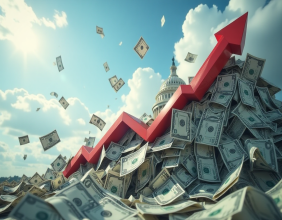Source:Peshkova, Shutterstock
Summary
- Declining rate of infections and falling rate of hospital admissions have increased the likelihood of speedier business recovery.
- A large part of the market optimism is due to the expected reopening of businesses.
UK shares are poised to register considerable gains in the present quarter, all thanks to the accelerated Covid-19 vaccination programme. The subsequent developments, including the four-stage roadmap of reopening, the declining rate of infections as well as the falling rate of hospital admissions, have increased the likelihood of speedier business recovery.
Low hospitalisation
Surprisingly, the rate of hospital admissions fell drastically last week. According to the National influenza and COVID-19 data superintended of the Public Health England (PHE), the hospital admission rate for people affected by Covid-19 has dropped to 2.70 per 100,000 individuals in week 12 as compared to the rate of 37.20 people per 100,000 in the first week of 2021.
UK Prime Minister Boris Johnson recently confirmed that the set of planned easing will be extended as prescribed in the roadmap, detailing the phased exit from the nationwide lockdown and the restrictions associated with it.
New car sales bolster optimism
As the markets reopened in the holiday-shortened week on Tuesday, 6 April, there was much rejoicing. The sale of new cars rising 11.5 per cent in the month of March on a year-on-year (y-o-y) basis supported the mood of the market participants. However, the relative gain in new car registrations in March 2021 is partially due to the lower sales in March 2020 on account of disruption in businesses due to large-scale emergence of Covid cases and the onset of the first national lockdown.
Last month, the UK recognised a sharp slump in new car registrations with the new car sales falling 35.5 per cent y-o-y to 51,312 units, marking the lowest February figure since 1959. The acute drop in the new car registrations has been attributed to lower disposable income and store closures due to Covid restrictions.
Over the long term, the sale of petrol and diesel cars is likely to slide downward, in line with the government’s push for electric vehicles (EVs), supporting the administerial plan to go net zero by 2050 and to eliminate all fossil fuel powered vehicles by 2035.
Also Read: Average house price hits new record high in March: Survey
Immunisation on track
According to the Department of Health and Social Care, the healthcare authorities have vaccinated more than 36.6 million people between the nearly four-month period from 8 December and 2 April. Of the total, approximately 5.2 million individuals have received the second dose of Covid-19 vaccine as part of the two-jab vaccination programme, while over 31.4 million people have been given the first dose.
Ahead of the second stage of reopening from 12 April, when the country is set to reopen shops, personal care services, zoos, beer gardens, gyms, and outdoor hospitality of all kinds, PM Johnson would be visiting a pub himself.
Re-energised optimism
A large part of the market optimism is due to the expected reopening of businesses as most of the deprived sectors are anticipating a quick turnaround in the operational metrics. With people returning to workplaces, the reopening of leisure and recreational activities is likely to catalyse the pace of economic recovery.
Most of the enterprises operating in tourism, travel, aviation, leisure, food and beverages, and offline knowledge delivery services were mandatorily required to shut either full or partial functions due to pandemic-induced restrictions mandated by the government. Barring any other major roadblock in the immunisation programme, the market participants are expecting a quick reversal in the services, thereby steering the cycle of recovery from the Covid-steered bottoms at breakneck speed.
The United Kingdom has responded strongly to the Covid-19 emergency, especially compared to major European economies and neighbouring countries, including France, Germany, Italy and Spain. Many countries across Europe have imposed further lockdowns to curb the rate of infections, at a time when Great Britain is planning to reopen fully.
Also Read: Top Pub and Restaurant Stocks to Keep an Eye on Ahead of Reopening Next Week
London equities ride through
The benchmark FTSE 100 has managed to record a gain of approximately 2 per cent in the last one month, riding through multiple aftereffects of macroeconomic indicators, the outcome of the Bank of England’s Monetary Policy Committee meeting, the positive developments surrounding the inoculation drive, the corresponding rate of infection and the continuous rise in the number of people having received the Covid-19 jab in the country.





